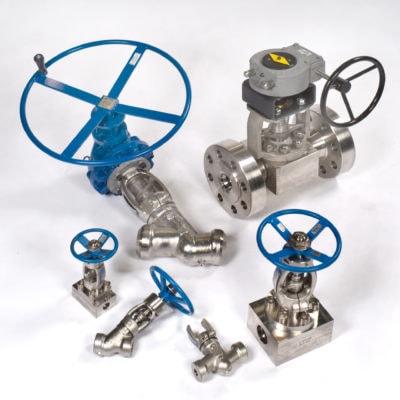Válvula para el Servicio de Urea Folleto

Las válvulas para servicio de urea Conval Clampseal® están diseñadas para las tuberías de alta presión de los condensadores, separadores y reactores de urea.
- Los costos de ciclo de vida más bajos de la industria
- Estilos de cuerpo modulares intercambiables
- Asiento hacia atrás accionado por presión
- Sistema de empaquetadura de alto desempeño
Standard Sizes and Configurations
Sizes through 6″
Configurations Include
Globe (Y-Pattern, T-Pattern, and Angle Styles), Gate, Check (Piston and Axial Styles), and Camseal Top Entry Ball Valves
Pressure Rating
ASME Class through 2500#
Standard Materials
UNS S31050 (25-22-2), F53, Ferralium 255, 316L, 316L Urea Grade, others as specified
Connections
Flanged End, (Raised Face, Lens Ring, Ring Type Joint) Hub Connector, Butt Weld, Socket Weld, others as specified
Accessories
Actuators – Electric, Pneumatic, Hydraulic
Locking Device – Open, Closed, Both
Limit Switch – Single or Dual
Position Indicator
Design Features
Conval Severe Service valves are designed for best in class service life and in-line reparability
Pressure-actuated Backseat
The Clampseal® pressure-actuated backseat provides maximum valve integrity by ensuring a positive internal stop for the valve stem and disc assembly. The pressure actuated backseat also extends packing life by securely isolating the packing from the pressure when the valve is fully open.
Axial-loaded Packing System
The axial design ensures tight concentricity, which eliminates side loading of the packing and minimizes wear forces on the trim components. This feature is critical for superior valve performance.
Urea Synthetization Applications
Conval urea service valves applications include high-pressure piping of urea reactors, strippers and condensers. Our valves are designed for use with ammonium carbamate, nitric acid, ammonia, and other urea process fluids. Designs include provisions for self-draining waterways and the elimination of collection points where the corrosive media (e.g. ammonium carbamate) can stagnate resulting in crevice corrosion and subsequent cracking.




